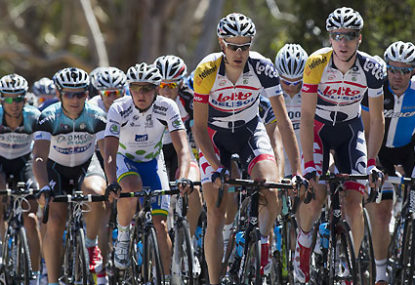'I've just won a stage of the Tour de France, mate!': Hindley grabs yellow jersey as Aussie blows Tour apart
Australia's Jai Hindley has said he is "lost for words" after a shock stage victory at the Tour de France earned him the leader's…

Stand on the outside and what do you see? You see riders moving incredibly fast, riding incredibly close, it looks incredibly dangerous.
Stand on the outside and what do you hear? You hear the quiet whizzing of chains, the synergistic shifting of gears and the descriptive expletives of riders as they give ‘direction’ to those around them.
Above all, it is the smell of burning cork brake pads on carbon rimmed wheels and the piercing screech that capture your attention.
Ride on the inside and what do you see? You see nothing right in front of you. You look four to five riders in ahead, you look for ripples in the peloton, potholes in the road or accelerations in the bunch. You think nothing of the handlebars that just jutted into your behind.
‘Good luck buddy, I am in front, you want to go down, fine, but you’re not taking my position.’
Ride on the inside and what do you hear? Very little, you hear your own breathing, you hear your own thoughts, you remain internally focused as you attempt to control the adrenaline that attempts to outwit and outdo your modest levels of common sense.
More often than not, it’s over before you had a chance to react. The sickening sound of carbon snapping and shattering leaves the crowd shuddering. The pile of riders in front of you sends you flying.
You hit the corpse in front. Your front wheel collapses. You hit the deck. Your skin is pulped. Your helmet is pummelled. Your collarbone often placed in two. It’s a big crash. It’s a pain in the physical and metaphorical arse.
But frankly, it’s just part of the game.
The first thoughts are always the same. Grab your collarbone, grab your wrist, are they broken? Check your hips for skin, is there any left?
Grab your bike, try to keep going. It’s never in vain. As embarrassment, adrenaline and anger surge through, your last thought is getting in an ambulance. You want to finish the race.
For some it’s a matter of pride. For others it’s a matter of practicality. Many find that continuing to move lightly before the body seizes up can help offset future stiffness.
You go home. You disinfect the wound. It stings, it bleeds, and it weeps. The lucky ones go to emergency to get the stones and pebbles scrubbed out of their flesh. Such joy.
There are never enough bandages to cover every knick and bruise. So by the morning the coagulation of blood and exudate leaves a thick crust that brings you and your bed sheets closer together.
Then the realisation; that niggle, that knock, the one you thought would just ‘buff out’. It hurts a lot more in the morning.
You scramble to the phone. You dial the doctor, chase the chiropractor, do whatever to see whoever, to get your problems sorted.
You wouldn’t dream of wasting $500 on a week of nice meals, but you’ve nearly tripled that with two days of intensive scans and treatments. You must get back on the road.
And the withdrawals hit. You haven’t trained ‘properly’ for a week. Your addiction to high heart rates and food intake is not satiated. Paranoia about impending unfitness and the looming burden of being overweight terrify you.
Your muscles appear to shrink before your eyes. Your resting heart rate starts creeping up. Your only choice is to attack. Perhaps the physio said only do 20 minutes a day to start with.
‘Great, I’ll do two hours instead because I’m a cyclist and I’m hard.’
What do you mean the doctor said to rest? Surely I know better than the man with a decade of degrees.
You have already missed one big race thanks to the last crash, now you face fronting up at the next one struggling so much that even being in the bunch with the possibility of a crash appears to be a privilege.
But it’s all part of the game.
Denial-Anger-Acceptance.
Crashes happen, some are terrified of them, and others thrive off them. Once you come to terms with your predicament, you settle down. You bounce between enjoying the serenity of your downtime to getting edgy with all that excess energy to burn.
Now you’ve accepted your predicament, it’s time to get going again. This time the doctor has given you the all clear.
Where training before threatened to become a chore, it is now cherished. It is a challenge once again. The refreshment of a forced outing forces one to recalibrate their goals and refocus their attitudes.
Fitness is gained, passion is restored, and carbon is replaced. The next race is coming. The next crash is coming.
We all just hope, honestly, that the two do not coincide quite so soon.